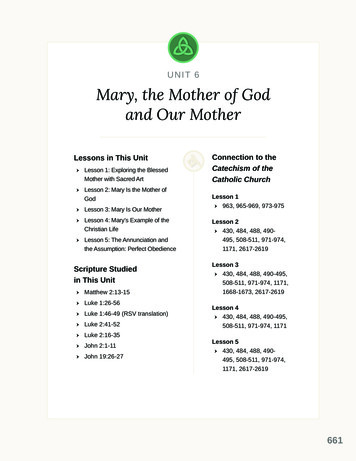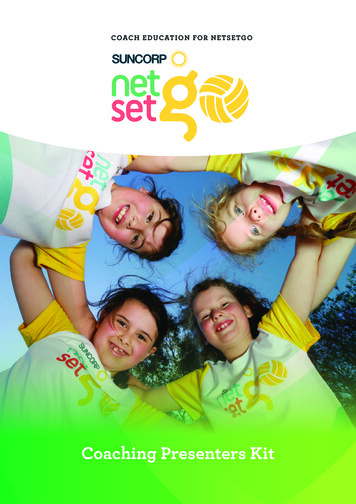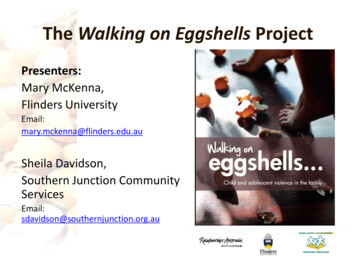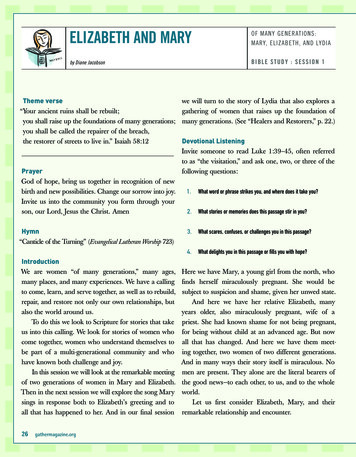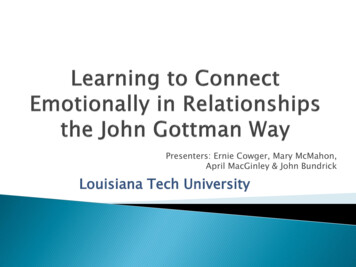
Transcription
Presenters: Ernie Cowger, Mary McMahon,April MacGinley & John BundrickLouisiana Tech University
Author of more than 190 academicpublications and author or coauthor of40 books.Dr. Gottman is highly regarded in theareas of marital stability, divorceprediction and parenting.Co-founder of the Gottman Institute,where he studies marital relationships
Executive Director of The RelationshipResearch Institute, a non-profit researchinstitute. Website: http://www.gottman.comProfessor Emeritus of Psychology at theUniversity of WashingtonFounder of “The Love Lab” where most of hisresearch was conducted on couples’interactions
The Seven Principles for Making MarriageWorkWhy Marriages Succeed or FailRaising an Emotionally Intelligent Child10 Lessons to Transform Your MarriageWhat Makes Love LastAnd Baby Makes Three
Examine your bids forconnection Discover your brain’semotional command systems Examine your emotionalheritage Sharpen your emotionalcommunication skills Find shared meaning
Examine your bidsfor connection
Can be easy to see and interpretDifficult to understandVerbal or nonverbalPhysical or intellectualSexual or nonsexualHigh or low-energyFunny or seriousThe content could involve thoughts, feelings,observations, opinions or invitations
Affectionate touchingFacial expressionsPlayful touchingAffiliating gesturesVocalizing
Turning Toward React in a positive way to a person’s bids foremotional connection Turning Against A person behaves in a hateful or argumentativemanner; This type of bid usually involves sarcasmand ridicule Turning Away Ignoring another person’s bid for emotionalconnection, or acting preoccupied
Two coworkers are talking, and one makes afunny comment and the other laughs.A wife discusses her desire to take a vacation,and her husband agrees and says they shouldstart working on a plan.
A wife asks her husbandto turn off the TV so theycan talk about theirhappenings that day, andhe sighed and said, “Whatis there to talk about?”
A friend might saysomething to this effect,“Look at that sports car,I would love to sport aride like that!”The other friend wouldnot even bother to lookup or respond to theremark, or he mightrespond with somethingcompletely unrelated,like, “What time is it?”
1. Being mindless instead of being mindful2. Starting on a sour note3. Using harmful words instead of helpfulcomplaints4. Flooding5. Practicing a crabby habit of mind6. Avoiding needed conversations
Being mindful is noticing other individual’sbids and responding to themBeing mindful is being in the moment withsomeone, being present in the relationshipBecome a collector of emotional momentsSet goals in your relationshipsConsciously look for opportunities to connectwith others
Start your bids on a softer noteBegin with something positiveExpress appreciation and gratitudeStart with “I” instead of “You”Don’t stockpile complaints Try to address issues one at a time, or as theyhappen Revisit the episode later with that person
Issue complaints when necessary, but notcriticism Complaints address a specific problem, criticismis more judgmental and personal How to appropriately issue a complaint; State your needs; do not attack or blame theother person Describe your complaint as your perception, notas an absolute truth Focus on a specific behavior you would like tosee changed, not on global judgments
What is flooding? When interacting with a person withwhom you already have a strainedrelationship, additional conflictdiscussions may trigger intenseemotions. The person becomes so stressedthey become physically andemotionally overwhelmed
Take a time-out from the conversation for atleast 20 minutes and self-soothe (Take a walk,meditate, progressive muscle relaxation, read,etc.)Do not think about the conflict during the 20minute relaxation timeAfter 20 minutes have expired, either get back tothe conflict situation or schedule another time todiscussExercise: Give the other person just one word tohelp them better understand your needs in theconflict situation
Look around and find things and people inyour environment that you appreciate insteadof having a critical attitudeSearch for reasons to say “Thank You”Make praise and thanksgiving a habit Keep a daily Journal of Thanksgiving, and attemptto write down several things, people or talents thatyou are thankful for each day
Many times arguments occur andresentments build due to a lack ofcommunicationIf you are surrounded by conflict in arelationship, take a look at issues that are notbeing discussed
Attack Avoid& defendor deny Self-disclose and connect***Derived from well-known psychologistDan Wile
An activity for spouses,parents, or friends to completeto better understand eachother, which will facilitateemotional connection. Answer the questionnaire as youthink the other person wouldrespond and circle any answers youdon’t know the answer to. Go over the Love Map with theother person to gain the correctanswers and share with each other.
1. Favorite Meal2. Special Hobbies or Interests3. Favorite holiday4. Ideal birthday present5. Ideal vacation destination6. Favorite TV shows7. Favorite kind of animal8. Favorite way to get over being sad9. Personal improvements you would like to make10. Best vacation you have ever had***An excerpt from The Relationship Cure by John M.Gottman, PH.D.
Discover your brain’semotional commandsystems
Definition: Nerve-based circuits thatcoordinate electrochemical signals in thebrain Researchers have found 7 separate systems that areresponsible for transmitting messages from 1 nervecell to the next until all of the cells throughout thebody are activated to carry out the desired service. Panksepp (a scientist) first identified thesecommand systems. He contends there are probablymore.
The Commander-in-chief The Explorer The Sensualist The Energy Czar The Jester The Sentry The Nest-Builder Dominance, control and power Searching, learning and satisfying curiosity Sexual gratification and reproduction Regulates need for energy, rest and relaxation Play, recreation and diversion Survival- Relates to worry, fear, vigilance Affiliation, bonding and attachment
1. Become more educated on your emotionalneeds2. Increase your ability to make bids forconnection and how to handle others’ bidsfor connection3. Better understand loved ones and friends
Examine youremotional heritage
Families deal with emotions in 4 different ways: 1. Coaching Family members help each other cope and solve problems 2. Dismissing Feelings are hidden and not acknowledged, so guidancerarely provided 3. Laissez-faire Expressing emotions is accepted, but they frequently waitfor feelings of anger, sadness or fear to pass. 4. Disapproving Feelings should be kept hidden, and they are critical towardfamily members who express emotions.
Sharpen youremotionalcommunication skills
Facial ExpressionsMovement & GesturesTouchTone of VoiceDescriptive WordsMetaphors
Focus on being interested,not interestingAsk questionsAsk questions about aperson’s goals anddreams for the futureLook for similarities
Occasionally paraphrase what the person saysMaintain appropriate eye contactLet go of directing the outcome of aconversationLimit television timeFocus your attention completely on thatpersonRespond with nods or sounds (minimalencouragers) during the course of theconversation
Find sharedmeaning
Shared meaning are things you and anotherperson have in common.This can be achieved when two individualssupport each other’s dreams even when thereis no gain for the other person.We can achieve shared meaning by: Communicating about our dreams and desires withanother individual Participating in ritualsButterfly Kisses
Rituals are predictable, becausethey are repeated over and overagain.Rituals differ from routines in thatthey have a symbolic meaning Example: Routine: Brushing your teethevery night Example: Ritual: Kissing your spousegoodbye before leaving for work Rituals ensure structure so thatemotional connections happen on aregular basis
Symbolize cultural identity andvalues shared with our family,friends, or communityEnsures that time is set asidefor emotional connectionHelps us to understand ourfeelings and process major lifetransitionsHelps us to remain connectedeven though we may havedifferences with others
Celebrating special days (Birthdays,anniversaries, holidays)Date night with your partnerTaking vacationsBedtimeDinnertimeAttending sporting eventsDoing charity workHandling Finances
MORE REAL WORLDAPPLICATIONS
Activities we can do to build relationships withour coworkersSay hello and goodbye each dayReturn borrowed itemsMake your coworker feel special on his or her birthdayRemember things that are of personal importance toyour coworker (pets, children, partner, travels) Laugh with your coworker Give your coworker encouragement when they arehaving a difficult time, or when they have had a success Be creative!!!
LunchCoffeePotluck lunchForm some type of interest group/club atwork (book club, running club)Volunteer for a community serviceorganizationPlan parties/celebrations for fellow coworkersCommute to work together
Thank you for taking the time to listen &explore with us the subject of developingstronger emotional connections!For copies of the PowerPoint, please emailecowger@latech.edu
The Relationship Cure Dr. John Gottman
